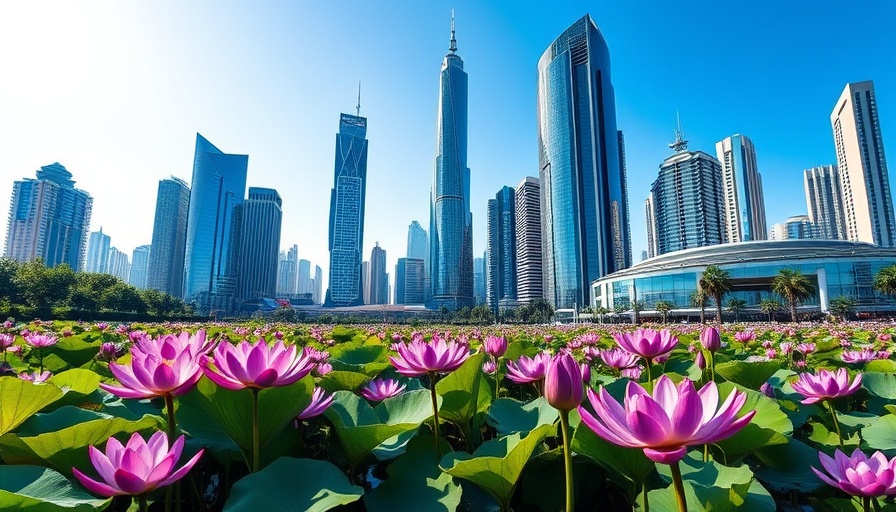
The Surge of Green Pragmatism in Asia's Financial Landscape
In just a few days, Singapore will play host to Asia's foremost leaders in climate finance, gathering at the annual sustainability summit organized by the state investor Temasek. From May 5 to 8, high-level discussions will center around practical approaches to achieving the region's decarbonisation goals by 2030. This meeting comes at a pivotal moment, as the Asia-Pacific region faces increasing economic and political hurdles amidst ongoing trade tensions.
Contextualizing the Climate Challenge
While Temasek has initiated the summit to tackle these pressing issues, the backdrop is one of uncertainty. The recent exit of major players from the United Nations-supported net-zero alliances indicates a retreat from ambitious climate targets. BlackRock and SMBC's decisions have raised eyebrows, as both financial giants previously committed to significant environmental goals. Meanwhile, countries in Asia are grappling with the immediate economic pressures of rising costs and energy security—causing many to sideline climate discussions in favor of more pressing expenses.
Voices of Sustainability: Insights from Industry Leaders
Kyung-Ah Park, Temasek’s chief sustainability officer, emphasizes the necessity of continuing climate action despite these challenges. “We must avoid taking our foot off the pedal with decarbonisation as we navigate these turbulent waters,” she states, highlighting the dual challenge of climate change and economic sustainability. The summit will thus explore solutions that range from high-tech innovations to more accessible, cost-effective strategies, demonstrating that ecological responsibility need not come at the expense of financial viability.
Examples of Pragmatic Solutions for Decarbonisation
Among the practical solutions discussed will be effective renewable energy options, such as the thermal batteries from Antora Energy, a venture co-developed with BlackRock. This technology highlights an essential aspect of green pragmatism: integrating sustainable practices into everyday business operations while maintaining a focus on affordability and energy security.
Charting a Course for a Green Economy
The upcoming discussions aim to address how Asian countries can leverage energy resources efficiently while advancing towards net-zero emissions. With many nations still relying on high carbon energy sources, the urgency to pivot towards cleaner alternatives is greater than ever. Financial leaders from institutions like HSBC will provide perspectives on balancing investments in green energy with economic growth, proving essential for building a sustainable future.
Tackling Sustainability Challenges: Integrity and Innovation
One of the crucial topics at this summit will include the revitalization of carbon offset markets—an area that suffered due to questions of integrity and transparency last year. The attendance of carbon project registries like Verra and Gold Standard speaks volumes about the need to rebuild trust and recalibrate efforts towards effective environmental strategies. The presence of oversight organizations such as the Integrity Council for Voluntary Carbon Markets (ICVCM) further reinforces the importance of such discussions.
The Bigger Picture: The Role of Policy in Climate Action
Decarbonisation discussions need to extend beyond corporate commitments to meaningful governmental policies that support sustainability initiatives. As climate change is sidelined by more immediate issues like inflation and economic stability, the conference aims to keep this urgent topic from being neglected. Moving forward, policymakers will play a crucial role in ensuring sustainable growth is the foundation of economic recovery in the post-pandemic landscape.
Taking Action: What Can You Do?
As consumers and responsible citizens, we can each contribute to this movement for sustainability. Prioritizing eco-friendly products, supporting sustainable businesses, and reducing our carbon footprints at home can create widespread change. Every small step counts towards supporting the global push for climate action. Collective responsibility paired with informed action is the key to achieving a cleaner, greener future.
Conclusion: A Call to Embrace Sustainable Living
As the summit unfolds, it’s crucial for those of us invested in the environment to stay informed and engaged. Supporting green initiatives starts with making conscious choices about the products we use and how we interact with our environment. Let's embrace sustainable living through ethical consumerism, renewable energy, and ongoing commitment to reducing waste. Together, we can pave the way for a flourishing, eco-friendly future.
 Add Row
Add Row  Add
Add 



Write A Comment